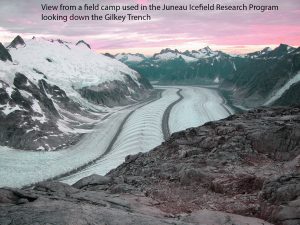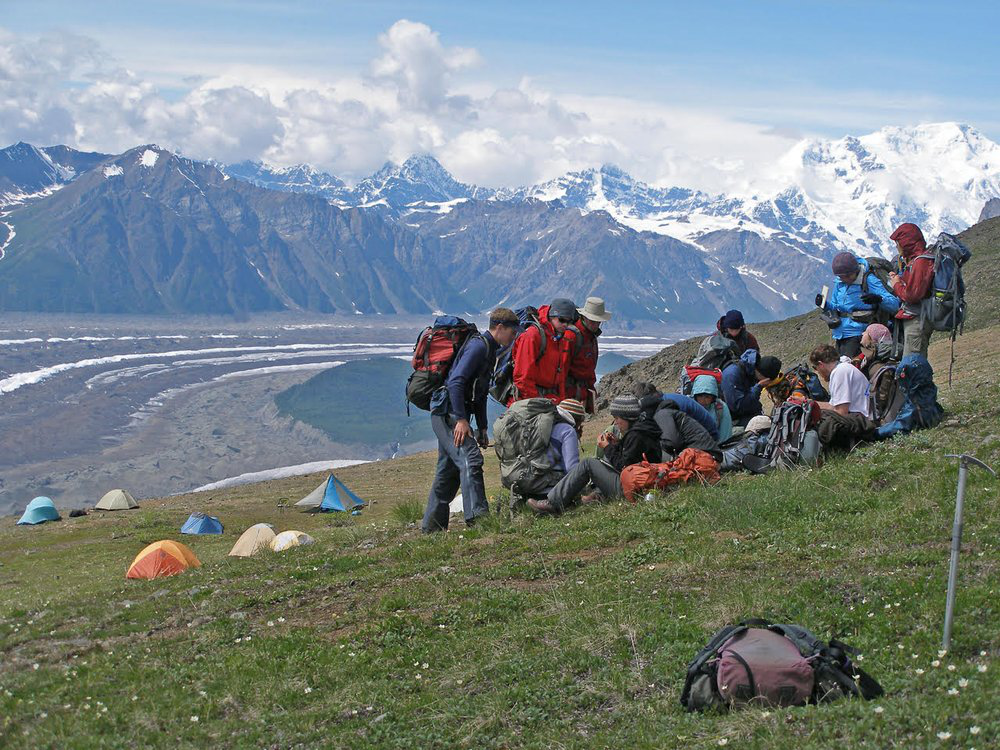Juneau Icefield Research Program and Wrangell Mountain Center

The University of Maine School of Earth and Climate Sciences (ECS) and Juneau Icefield Research Program (JIRP) are growing their institutional collaborations! JIRP, an entity operated by the non-profit 501(c)(3) Foundation for Glacier and Environmental Research (FGER), has been highly successful over the past six years through its affiliation with the University of Maine ECS. This includes a significant increase in student and faculty opportunities as well as research and education funding that University of Maine has been involved with hailing from the National Science Foundation, NASA, Department of Defense, Battelle, and other sources. We are excited about recent changes in leadership structure to facilitate continued JIRP growth and new opportunities. In 2024, FGER and University of Maine partnered with the University of Colorado, Boulder (UC Boulder) to co-lead JIRP. Dr. Brad Markle at UC Boulder is stepping into the Director of Academics role and Dr. Seth Campbell at the University of Maine has transitioned from his previous role as Director of Academics & Research to Director of Research for JIRP. This transition distributes the growing workload associated with increasing JIRP success and will assure that JIRP continues its world-class research and education programs. Lastly, we continue to work closely with University of Alaska Southeast (UAS) on both education and research. Our collective goal is to leverage the institutional consortium of UMaine, UC Boulder, and UAS to offer the best Polar Earth systems science field education and research opportunities in North America. We are excited for what the future holds!
Background: JIRP’s mission is to teach, train, and inspire the scientific leaders of tomorrow. JIRP’s focus is on 1) training the next generation of scientists to help solve major environmental issues such as climate change, and 2) conducting cutting-edge research in glacier and mountain environments of interest and benefit to society. JIRP has a tremendous legacy as the longest operating glaciological and climate field research and education program in North America. Since 1946, it has been on the front line inspiring new scientists, environmentalists, science policy advocates, and educators. JIRP is unique relative to most academic programs because faculty affiliated with dozens of institutions participate each summer, thereby providing a tremendous opportunity for broad collaboration and societal impact. JIRP is developing into a thriving global community science research and education resource. The new institutional partnerships are monumental steps which we hope will provide many new opportunities for undergraduate students, graduate students, educators, and researchers throughout the United States. Several students and faculty from UMaine have participated in JIRP during prior years and we only expect this participation to increase in future years. JIRP operated through a non-profit 501(c)(3) called the Foundation for Glacier & Environmental Research. The JIRP Director of Research, Seth Campbell, is an Associate Professor in the School of Earth and Climate Sciences (ECS) and the Climate Change Institute (CCI). For more information about JIRP and potential research opportunities, please visit juneauicefield.org or contact Seth at scampb64@maine.edu or +1 (207) 581-3927.
Wrangell Mountain Center Field Studies Program
The University of Maine has a new partnership with the Wrangell Mountain Center, a non-profit, 501(c)(3) organization that operates the Wrangell Mountain Field Studies (WMFS). This field studies program will now be offered as a 6-credit summer course through the School of Earth and Climate Sciences (ECS). This field course is available to students at University of Maine or from other universities across the globe, where credit can be transferred following course completion.
 Advanced high school students (junior or senior standing) and those who have completed high school and/or an undergraduate degree will also be considered. The WMFS provides exceptional and unique instruction and research opportunities in the high latitude and alpine environments of Alaska. The WMFS and JIRP programs differ in scope and emphases: JIRP focuses on Polar Earth systems sciences in the highest elevation alpine regions. WMFS focuses on linked alpine, glacial, and boreal systems, including their ecology, geology and social contexts. The curriculum of the WMFS explores geophysical, ecological and cultural landscape processes from perspectives of sciences, humanities and public policy. WMFS takes place in the Wrangell Mountains of Alaska, at the intersection between rugged alpine, glacial, boreal, volcanic, wild, and inhabited landscapes. Within this exemplary setting for learning about change and stability in far-from-equilibrium conditions, students inquire into energy and material flow, tectonics, ecological succession, and adaptation in the context of climate change. Independent group projects offer student opportunities to dive more deeply into these topics, including scientific research and artistic study according to student interests. The program is taught as a collaborative learning community by interdisciplinary faculty, preparing participants for future work engaging complexity in a rapidly changing world. Since 1971, the program has been based at the non-profit Wrangell Mountains Center in McCarthy, Alaska, with four of the program’s seven weeks spent backpacking on and above the Kennecott Glacier and in adjacent valleys. Wilderness skills are taught; previous experience not required. Most students are upper-division undergraduates with majors in diverse fields, though students not presently enrolled as undergraduates have also participated successfully. The program may meet academic field camp and capstone project major requirements. For more information about WMFS and potential opportunities, please visit wrangellmountainsfieldstudies.org or contact the ECS Director, Professor Karl Kreutz, via karl.kreutz@maine.edu.
Advanced high school students (junior or senior standing) and those who have completed high school and/or an undergraduate degree will also be considered. The WMFS provides exceptional and unique instruction and research opportunities in the high latitude and alpine environments of Alaska. The WMFS and JIRP programs differ in scope and emphases: JIRP focuses on Polar Earth systems sciences in the highest elevation alpine regions. WMFS focuses on linked alpine, glacial, and boreal systems, including their ecology, geology and social contexts. The curriculum of the WMFS explores geophysical, ecological and cultural landscape processes from perspectives of sciences, humanities and public policy. WMFS takes place in the Wrangell Mountains of Alaska, at the intersection between rugged alpine, glacial, boreal, volcanic, wild, and inhabited landscapes. Within this exemplary setting for learning about change and stability in far-from-equilibrium conditions, students inquire into energy and material flow, tectonics, ecological succession, and adaptation in the context of climate change. Independent group projects offer student opportunities to dive more deeply into these topics, including scientific research and artistic study according to student interests. The program is taught as a collaborative learning community by interdisciplinary faculty, preparing participants for future work engaging complexity in a rapidly changing world. Since 1971, the program has been based at the non-profit Wrangell Mountains Center in McCarthy, Alaska, with four of the program’s seven weeks spent backpacking on and above the Kennecott Glacier and in adjacent valleys. Wilderness skills are taught; previous experience not required. Most students are upper-division undergraduates with majors in diverse fields, though students not presently enrolled as undergraduates have also participated successfully. The program may meet academic field camp and capstone project major requirements. For more information about WMFS and potential opportunities, please visit wrangellmountainsfieldstudies.org or contact the ECS Director, Professor Karl Kreutz, via karl.kreutz@maine.edu.

